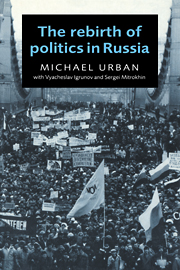Part IV - Ground up: politics in post-communist Russia
Published online by Cambridge University Press: 22 October 2009
Summary
The word-play in this part's title both underscores the perspective that we have employed to frame Russia's political rebirth and suggests something about the fate of those forces in political society that brought it about. On one hand, our interpretation of the recovery of political life – as much as it may have depended in its early stages on certain dispensations issued by the Gorbachev leadership – has emphasized the fact that it was a mass phenomenon involving countless choices, risks, sacrifices and acts of courage by individuals and groups of people. Politics, that is, came from the ‘ground up’. On the other, the particular path followed by political society, the path of struggle against the Soviet party-state, also shaped its institutions and its relations with the Russian state in critical and, perhaps, fatal ways. In the end, those forces accounting for Russia's political rebirth have been ‘ground up’ themselves; defeated, coopted or marginalized by the executive apparatus of the state.
Organized as a reverse-order counterpart to Part I, the chapters here are laid out along diachronic and synchronic lines. The narrative in Chapter 11 traces political society's division to the statist/monetarist strategy of transformation adopted by Russia's post-communist leadership. Ironically, this strategy progressively undermined the coherence of state institutions while it simultaneously contributed to the political capital of the most extreme forces arrayed against the government. The violent termination of that struggle inaugurated a new constitutional order in Russia inscribed with executive dominance.
- Type
- Chapter
- Information
- The Rebirth of Politics in Russia , pp. 255 - 256Publisher: Cambridge University PressPrint publication year: 1997



